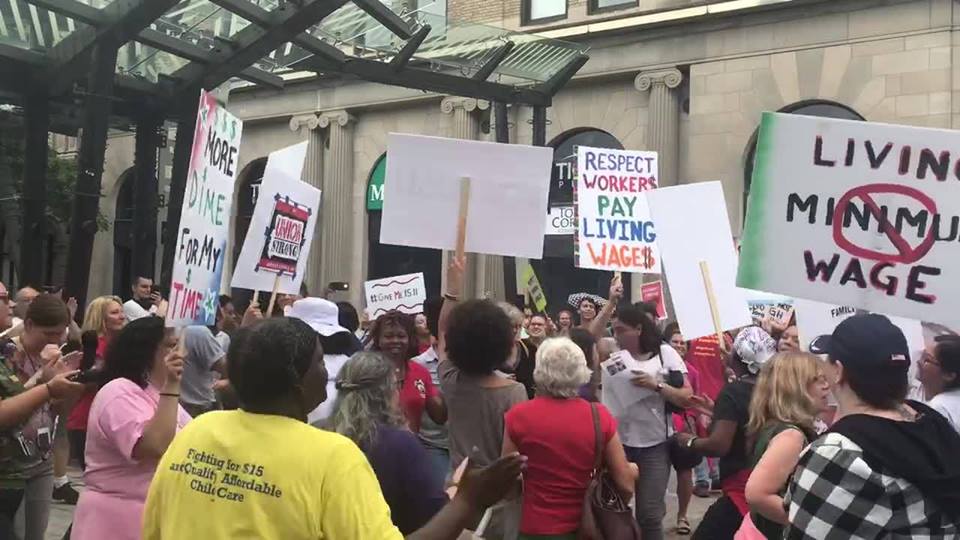Paycheck Racism in Tompkins County: Close to 3/4 of Black Workers in Tompkins County Earn Less than a Living Wage
(Ithaca, NY) New research initiated by the Tompkins County Workers’ Center, and carried out by Cornell-Industrial and Labor Relations (ILR) Buffalo and Ithaca Co-Labs, has uncovered how deep racism in Tompkins County goes, and how important raising our minimum wage to a living wage really is.
Almost three-quarters of all Black workers, over age 18, in the County (74%) are paid less than a living wage, compared to a little over a quarter of all white workers, over age 18 (28%). So Black workers are almost three times as likely to be sub-living wage workers than whites.
Paycheck racism in Tompkins County, as bad as it is, is only the tip of the problem. These figures cover only workers, those in the labor force at any time. But in recent years we know that the lack of living-wage jobs have pushed an increasing number of men out of the labor force, as has the large number who are incarcerated. And we know from national data that these trends disproportionately affect Blacks, so the gap between what Blacks and whites earn is even worse than just looking at wage data alone.
“At a time when ‘Black Lives Matter’ has become an opportunity for mostly performative and symbolic gestures of support in many communities, these numbers show the urgent need for substantive programs of redistribution to address entrenched disparities of race and class. Black life cannot not truly ‘matter’ as long as Black workers and other vulnerable people of color are disproportionately trapped in economic insecurityâ€, says Russell Rickford, Black Lives Matter Ithaca leader and Associate Professor of History at Cornell University.
“Making the minimum wage a living wage,†said Pete Meyers, Tompkins County Workers’ Center Coordinator, “is the single most significant thing we can do locally and across the State to improve lives and reduce the racist wage and earning gaps between whites and Blacks.â€
“Our research confirms that Black workers are concentrated in lower paying jobs,†said Russell Weaver, Director of Research, Cornell-ILR Buffalo Co-Lab. “This data makes clear how racism permeates our society, exacerbates inequality, and holds back progress for Black men, women and their families.â€
####



July 10, 2020 @ 5:58 pm
This new/old form of slavery (including prison slavery) MUST STOP!! NOW. Enough is enough. We shall flood the streets until justice and equality is realized.
July 14, 2020 @ 11:36 am
Absolutely, Raqul!
July 11, 2020 @ 8:27 am
I think calling differences in wages racist is a stretch. If you don’t have any skills your work is worth less than someone’s who has skills end of story. You are way too quick to jump on the race bandwagon.
July 14, 2020 @ 11:27 am
Don’t you think that skills, education and opportunity are connected to race dynamics?
July 22, 2020 @ 12:39 pm
In one way yes, Robert. But then again, whatever lot in life one was born into often helps to determine where one will be as one grows up (of course there are exceptions, both ways). A poor Black person is going to have a much harder time accumulating those skills, education and opportunity, than a white person (or any other person) who HAD such advantages. What we’re saying is that there are some systematic and historical tendencies that have advantaged the white population over people of other races. But class dynamics also enter into the picture. As we know, of course there are plenty of white people living in poverty as well…..just that the percentage, relatively speaking, isn’t as great as people who are NOT white.
July 14, 2020 @ 11:41 am
The problem, Joe, is that the historical system in place has favored the white race who, thru the centuries, consolidated power. This has ended up putting tthe Black population (and OTHERS) at great disadvantage. OF COURSE, and at the same time, there are a GREAT MANY white people, because of our class-based system, are making very low wages. But the percentage of the different races of people is very big difference. To wit, in re-looking now at the stats that we put up online, there are actually *16* times as many white people in Tompkins County that make less than a LW than black people. But then again, there are *22* times as many white people in the County!
July 11, 2020 @ 5:46 pm
I work with young people of color for 17 years. Nothing hurts me more than turning down an opportunity of these yonder people. When I have a job for them , which pays $20 an hour and there is a possibility of a growth, they would rather stick with fast food chain – just to eat what they like.
July 14, 2020 @ 11:42 am
Wow, that’s sad, Elena!
August 14, 2020 @ 12:04 pm
Any color any race can go to Midas Muffler, Monroe Brakes and Mufflers and GoodYear Auto REpair to name a few. They need workers and cannot get cars fixed fast enough.
15 and hour, is a great starting wage up to 45 and hour for a skilled mechanic.
This goes for plumbing, electric and HVAC to name a few more.
PRIVILIGED. You are Privileged to live in America, I do not discount BLM, but get real, there are opportunites, go out there and do it. We actually have foreigeners taking these positions, owning gas stations and stores because Americans(all colors and beliefs) do not want them. What else can we do, we have to start some where. With the pandemic Americans need to think one race, the human race and get everyone to work. It may not be your dream job, but it pays. In my humble opinion, I welcome responses. Have a great day